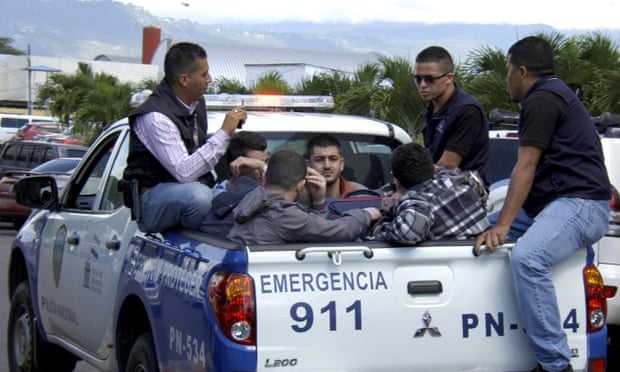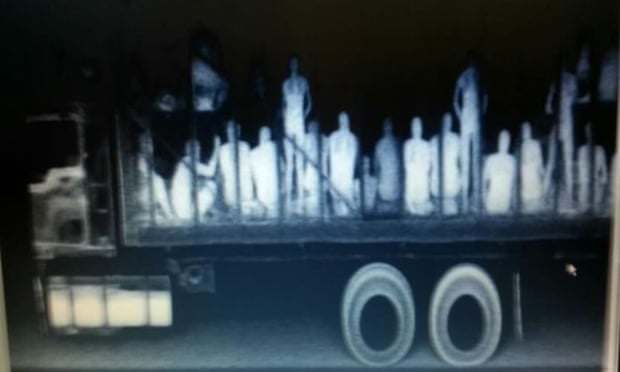The additional burden on USSCOM and diplomatic relations has yet to be realized or measured.
Global refugees take long detours through Latin America to reach the US

Guardian: Recent events involving Syrian refugees arriving at North American borders have brought to light the increased global traffic along the continent’s migrant routes
When eight Syrians handed themselves in to immigration authorities on the Texas-Mexico border last week, the incident was held up by conservative politicians as a troubling reflection of the new threats facing the US after the Paris terror attacks.
Similarly, news that five Syrian men had been detained in Honduras with false Greek passports was presented as a novel – and potentially sinister – development.
But both groups are most likely part of a steady stream of migrants from around the world, who have in recent years quietly started to follow the well-trodden routes used by Latin Americans to reach the United States.
As well as Syrians, migrants from Nepal, Somalia, Eritrea, Ethiopia and Pakistan now regularly make the long detour through Latin America, joining the flood of Central American migrants seeking refuge from violence.
Officials say that the nationalities using the migrant routes vary as humanitarian or political crises flare up around the world: the number of Syrians started to increase since the uprising against President Bashar al-Assad began in 2011, and has ballooned as the civil war has worsened; more Cubans have sought to reach the US since Havana began to reestablish diplomatic relations with Washington.
“Over the past decade, Latin America has definitely become a route of entry to the US for Asian and African migrants, said Ernesto Rodríguez, a migration expert at Mexico Autonomous Institute of Technology (ITAM).
That shift is becoming a serious concern in the region, prompting authorities from transit countries to call an emergency meeting on “extra-territorial” migrants in Costa Rica on Tuesday.

Colombia is an attractive route because it is not a crime to have entered the country irregularly. The worst that can happen is that migrants get deported back to their point of entry.
But Ecuador will not accept deportees who are not nationals of that country. “All we can do is drop them off at the bridge at the border and walk away,” says one Colombian official.
Most often, smugglers tell migrants that if they are caught they should request refugee status. Once asylum is requested, authorities grant them a safe conduct pass for five days to present their case to the foreign ministry. Most never show. They use the reprieve to continue their journey northward.
In Colombia, 68 Syrians have been detained since 2012, as well as 372 Somalis, 132 Pakistanis and 18 Eritreans, according to figures from Migración Colombia.
In Mexico over 300 Nepalese were apprehended between January and September this year – more than quadruple the number in 2014, while the number of Indians detained has more than doubled to 310. Seven Iraqis were detained in Mexico the first nine months of 2015, compared to a total of five in the previous three years. And at least 40 Syrians have been apprehended trying to make it to the US since the outbreak of civil war in 2011.
The number of migrants from the Middle East, Asia and Africa pale in comparison to Cubans who have chosen to take the land route to the United States rather than the traditional sea journey toward the Florida coast. The number of Cubans entering the US has surged since President Obama announced a renewal of diplomatic ties with the Caribbean country last December following more than 50 years as cold war enemies.
This recent exodus is promoted by fears that the so-called wet-foot, dry-foot policy – which fast-tracks legal residency for undocumented Cubans in the US as long as they arrive by air or overland – could soon come to an end.
Almost 27,300 Cubans entered the US in the first nine months of this year – a 78% rise on the same period last year, according to the Pew Research Centre. Two-thirds of those travelled overland through Mexico and entered the US at the Texas border. Many others have been stopped along the way; Mexico detained 6,447 Cubans in the first nine months of 2015, and more than 4,000 were apprehended in Colombia in the first eight months of the year.
According to the Asssociated Press, 2015 may witness the biggest outflow of Cubans since the 1980 Mariel boatlift that brought 125,000 people across the Florida Straits.
Many of those are likely to head south before they head north, said Rodríguez. “Smugglers are always looking for easier routes, which is why we’ve seen the increase flow through Latin America.”





